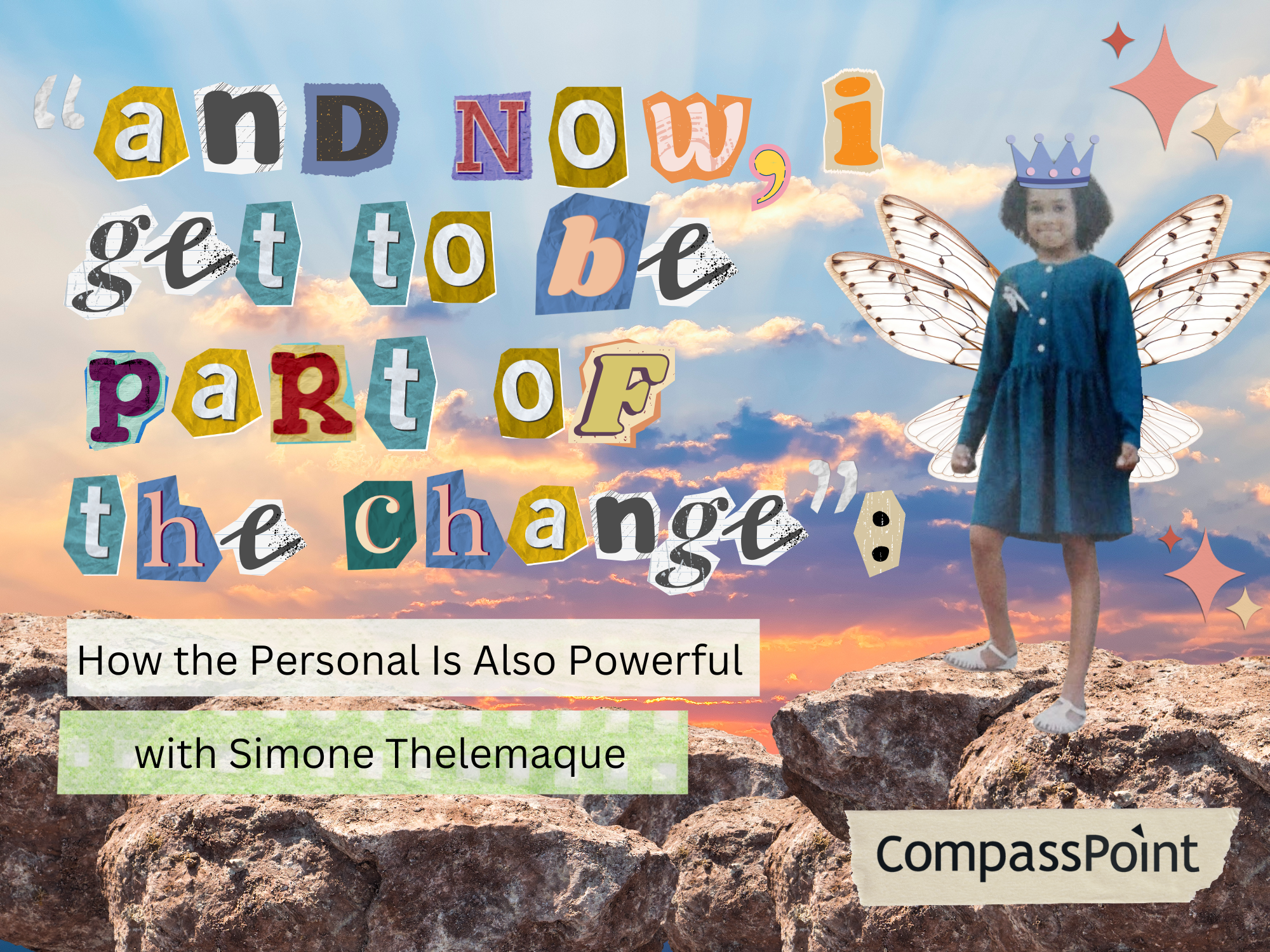In this blog on convening staff racial identity groups, Project Coordinator Kad Smith shares what he learned from facilitating CompassPoint’s People of Color Caucus. Racial caucusing has been one of the steps we’ve been employing as an organization to process and clarify our individual and group understanding of race and jointly define a racial equity agenda that will guide CompassPoint’s internal operations and work in the community. Read more about our goals in our recent blog here.

Over the last year, I’ve had the opportunity to help steward CompassPoint’s staff commitment to explore how our racial identities influence and inform how we work together. As a part of this effort, we held a circle process in mid-2015 that spawned a commitment over the course of 2016 to meet each month in racial affinity groups, also known as race caucuses, to discuss how our individual experiences have informed our perspective on race and racial equity.
We created two staff groups – the People of Color Caucus and the White Caucus – to investigate how these lived experiences consciously and subconsciously impact our approaches to the work. This commitment is one that I am deeply grateful for and also feel is imperative for any organization that wants to do racial justice work. In this blog, I share what I’ve learned as a person of color staff member from racial caucusing and our deepening practice of racial identity exploration within an organizational context.
In the role of “People of Color Caucus Organizer,” I was tasked with figuring out how we as staff members of color would meet, designing to what end we would meet, and ultimately incorporating the ideas of members of the caucus to make sure our time together felt constructive and useful. It was by no means a simple task, but it was one I was energized by. I was thrilled because I had quite honestly not heard of many other organizations that were willing to take on this approach. To dedicate organizational resources (i.e. money) was to me, emblematic of CompassPoint’s decision to truly put racial justice at the center of work.
Why Convene Race Caucuses?
I must admit when I first heard about the idea of caucusing at CompassPoint I wasn’t sure what to expect. In our early conception, we knew we wanted to provide a space for the collective exploration of race, class, power, and privilege, but I think it’s fair to say that many folks had imagined various scenarios of how this might take form. What we did know was that we needed a space for people of color to convene outside of the gaze of our white colleagues. We understood that people of color needed a space to talk about how our experiences in both this work and in this world can be eerily similar and drastically different. Additionally, there was a sense within the POC Caucus that the space might help us figure out what solidarity could look like for us as people of color committed to the work of social, racial, and gender justice.
We also knew that white folks on staff had a mandate to explore whiteness and its impact on their work as practitioners at CompassPoint. As I explained this thinking to various folks across the sector, many would ask why I felt so strongly about separating the groups to discuss race. Many folks would ask, “Doesn’t that take us backwards?” and “How can we come together when we are apart from each other?” These are sensible questions but they are built on the premise that we are starting from a similar analysis of how race impacts us as individuals and on the interpersonal and institutional levels.
Let me be clear, I don't think I'm alone in my assertion that it's important to convene identity-based caucuses along racial lines. My reasoning is informed by my own experiences and is admittedly strongly biased. In the process of exploring and talking about race in an organizational or professional context, I have personally seen how the vulnerability of people of color in multiracial spaces is seldom matched by white colleagues.
The social conditioning of many folks of color often imposes a hyper-awareness of how race influences our social mobility. Many working class people of color (note the intersection of class) don’t have a choice in understanding how our identity shapes how the world engages and often targets us. In fact, an understanding of our racial identity is highly important for both survival and as a tool for upward social mobility. In this sense, reflecting on why race matters is generally more of a necessity to us folks of color than our white colleagues who have yet to begin that deeply introspective work. That work is often highly alarming and shocking for a great many white folks to seriously engage in. (For more on this subject, read the article "Why White People Freak Out When They’re Called Out About Race".)
Furthermore, to be frank, a great many people of color are tired of having to educate white folks on how racism manifests on the interpersonal and institutional levels. We are fatigued from constantly having to “provide examples” of how racism shows up in our organizations and workplaces. We are exhausted from having to hold white folks’ hands through their own exploration of what whiteness means in a white supremacist system. The work of exploring whiteness should be the prerogative of white folks who are truly committed to social and racial justice. In order to do so, white folks must explore the conditioning that exists which makes questioning and exploring their whiteness seem so unobtainable, difficult, jarring, and complicated. As a person of color, the prospect of a White Caucus at CompassPoint intrigued me for that very reason. It provides white folks with the space to explore whiteness outside of the gaze of people of color and without people of color needing to (knowingly or unknowingly) engage in the emotional labor of attending to white fragility.
What I’ve Learned from Our POC Caucus
As our caucusing has progressed, I’ve learned a few things I would recommend be taken into consideration when discussing the value and challenge of convening racial identity spaces:
- What You Call It Matters: In calling our racial identity spaces Race Caucuses, there were many folks who thought of the space as one that was political in nature. While I don’t think they are wrong (any time we are exploring race, it is a social and political exploration), it did cause a dynamic in our group for folks to question to what end we were caucusing. Were we caucusing for organizational change? Were we caucusing for representation on the management team? More recently, it’s become clear that the racial identity spaces are less about what we are “doing” together and, instead, more about convening to discuss how we are “being” together. By focusing on “being” together, I mean that we structured the caucus to prompt reflection rather than structuring it to respond to all of the needs of CompassPoint’s practice that have to do with race and racial equity. By clarifying this pivot, we opened up the space for folks to more deeply share our stories, build relationships, and ultimately be in community as people of color. We prioritized individual reflection over the need for collective reaction to organizational needs and we did so with an understanding that simply “being” as folks of color is indeed an act of challenging dominant culture. That said, our caucus has proactively worked to acquire organizational influence around appointments to roles and positions, so in some sense it has been a hybrid of “doing” and “being.”
- Coming Together is Important: Throughout our experience, we’ve been challenged by how to configure “coming-together” sessions between the POC and White Caucuses. There has been some collective trepidation, which is entirely reasonable. When folks start talking race in a POC / White space with power dynamics and organizational politics at play, you run the risk of it getting messy and of potential harm being done (even when the intention is one of healing). That said, on the other side of that messiness, I think we could arrive somewhere beautiful for our practice. I witnessed slivers of it last year at our end-of-year staff retreat. The beauty rests in the emergence of unprecedented honesty and a shared willingness to take off the professional armor and embrace the vulnerability of bringing our full selves into the work.
I think having a clear outline of how the caucuses would come together and tightly facilitating joint sessions would have enriched the experience. Going forward, I think that is what’s next for our racial identity exploration at CompassPoint.
- Outside Facilitation: Bringing in outside facilitation for some gatherings also could have been helpful in this collective quest. While it was tremendously enriching for me to step into the role of POC Caucus Organizer, I think being a staff member unintentionally had an impact on how I was able to shape the discourse within the caucus. I think the opportunity to challenge the caucus to go deeper in our sharing, to build more substantial relationships among us as staff, and to ultimately push us to address our own solidarity (or the absence of it) as POC could have been more accessible to an outside facilitator. As we start to think about intensifying our work of anti-oppression and liberation, I think this is something our practice will seriously mull over.
- It’s Worth the Time: I one-hundred-percent think that racial identity caucuses have improved our individual and collective ability to talk about race. Caucusing has in many ways helped us take off our professional armor and truly bring our full selves to work. It has allowed us to normalize difficult conversations and for individuals to feel more empowered in naming the “elephants in the room.” Without the organizational commitment to this time and space, I do not think the advancement of our racial justice agenda would be where it is today. It has been time well spent and it is time that I hope CompassPoint continues to prioritize as we continue to center racial justice and racial equity in our work.
In all, I would highly encourage experimenting with racial identity caucuses or racial affinity groups within organizations looking to take their commitment to racial justice to the next level. I would also say there is room to convene these identity spaces with an intersectional lens (sexual orientation, gender, organizational power, etc.). While we have yet to do this at CompassPoint, I would not be surprised if it was an approach we took in the years to come as we deepen our practice in the work of being an anti-oppression organization.
If the goal of our organizations is truly to create a more equitable world, our organizations must decolonize the way in which we work. We must think differently about what productivity looks like, we must provide spaces for colleagues to be in community and to build more-than-collegial relationships. We must be willing to unlearn the toxicity that surrounds our racial identities and support our staff in their tumultuous ride of doing so. (The People’s Institute for Survival and Beyond offers these helpful insights into the two forms of internalized racial oppression: racial inferiority and racial superiority.) Ultimately, the absence of doing this work is merely an avoidance of addressing that which inhibits us most from completely reimagining our personal purposes in the efforts to build more equitable organizations. Upon crafting these more equitable organizations, I truly believe we will be providing ourselves with the tools we need to forge a drastically different society and future.
Kad Smith is an associate project director at CompassPoint. He specializes in supporting CompassPoint’s Cohort Leadership Programs, teaches in our public training program, and has provided project support for various consulting contracts.
Read other blogs by Kad:





Submit a comment
(1) Comments
Gilbert N Gonzalez replied on Permalink
Love all that you had to say and it's true there is definitely learning that still needs to happen. Being of latino background I've had to endure, deal with, try to understand everyone's perspective and try not to let the negative affect me but onr thing I must remember is that LOVE conquers all :)